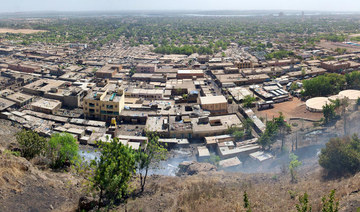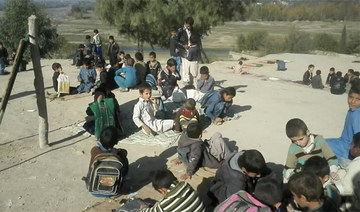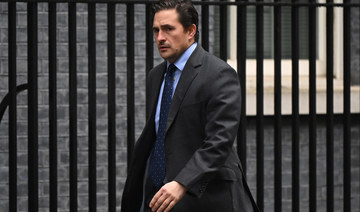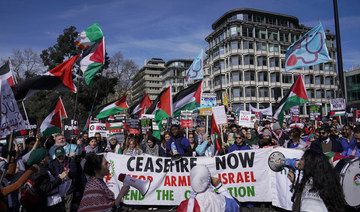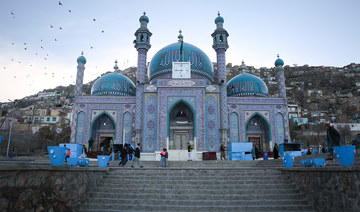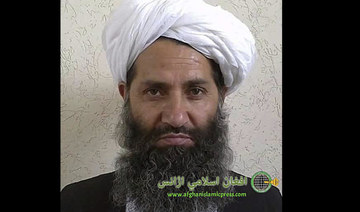SEGOU, Mali: In a better world, nine-year-old Oumou Tomboura would have already had several years of schooling behind her and be able to write, read and count.
But in Mali, education is another casualty of conflict.
When the new academic year began last week, Oumou sat not on a classroom bench but on a mat outdoors in the southern-central town of Segou, chopping onions and tomatoes for the next meal.
Her family is among tens of thousands to have fled militant groups working their way southwards from the desert north to central Mali in a seven-year-old insurgency, battling the army and its allies.
Six months ago, Oumou’s mother, Fatouma Dja, 29, left the dangerous village of Mamba, finding refuge for her three children 200 kilometers away.
“Of course I would like her to go to school, but it isn’t possible,” Dja said.
“When Oumou was old enough to go to school in Mamba, jihadists came and threatened the teachers and the school was closed. So she never went,” Dja said wearily, bearing her youngest child on her back.
Renowned for venerable centers of learning and trade down the centuries such as Timbuktu on the southern edge of the Sahara and for a remarkable musical heritage, Mali is badly battered by the revolt.
A fresh blow came this week with the deadliest militant raids of the insurgency on two military camps in central Mali, where 38 soldiers were declared killed and dozens missing.
In Segou, not a single school admitted displaced children alongside the town pupils on Tuesday, when classes resumed.
The situation in Segou is overwhelming — more than 20,000 people have taken refuge there, and Mali is a desperately poor nation.
But Abdoulaye Diallo, a member of Segou’s Educational Action Committee, which oversees primary schooling in the town, said displaced families should not despair.
“The displaced should come and register with us, so we can point them to a school that will take them,” he said.
Dja said she was not informed of this.
In any case, she was busy doing her sums, totting up the cost of new clothes, shoes and school supplies. “It will cost 50,000 CFA francs ($83) and I don’t have that,” she said, lowering her eyes.
The new school year will be just as hard for those who stayed behind.
One school in three has shut down in the Mopti region, which is most affected by raids from militants loyal to ethnic Fulani — or Peul — preacher Amadou Koufa. The raids prompt retaliatory violence by self-proclaimed community defense militias.
Across Mali, 920 schools are listed as closed, more than two-thirds of them in the three central regions — Mopti, Segou and Koulikoro.
At the local education authority in Segou, regional director Itous Ag Ahmed Iknan, said he had just been informed of dramatic events in the village of Souba.
The previous week, eight militants had gone there, where they preached for 50 minutes.
“In their preaching, they insisted that schools be closed,” he said.
“The army has to come back, so that the zone can be secured, otherwise the schools will not re-open.”
French military intervention in 2013 drove militants forces out of key northern towns including Timbuktu, Gao and Kidal, and Paris today lends military support to the Malian army and regional troops of the G5 Sahel force set up to counter insurgents.
Militant forces have steadily moved into the center, usually adopting guerilla tactics. Violence by armed groups has also led to school closures in neighboring Burkina Faso and Niger, according to the UN.
The Bamako government and international organizations have responded with lessons by radio, a framework of psychiatric support to help children affected by trauma or post-traumatic stress, and ad-hoc learning centers in villages and camps.
For Modibo Galy, a Malian researcher at the University of Leiden in the Netherlands, “in the eyes of the Amadou Koufa group, schools are the incarnation of Western culture, a symbol of the Westerners they are fighting.”
“Teachers are civil servants who sometimes come from outside the region,” Galy said. “They may become suspected of passing information to the army, of being spies.”
Under this intense pressure, teachers often quit, one by one, and the school’s lifeblood can drain away.
Mali conflict robs displaced children of school
Mali conflict robs displaced children of school
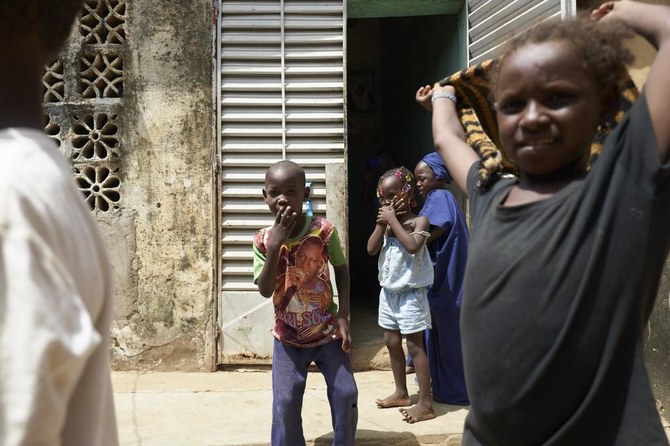
- Militant groups are closing schools down in Mali
- Recently they attacked two military camps and killed 38 soldiers
Israeli private eye arrested in UK over alleged hacking for US PR firm
Forlit was arrested under an Interpol red notice at London’s Heathrow Airport
LONDON: An Israeli private investigator wanted by the United States was arrested in London over allegations that he carried out a cyberespionage campaign on behalf of an unidentified American PR firm, a London court heard on Thursday.
An initial attempt to extradite Amit Forlit to the United Sates was thrown out by a judge at Westminster Magistrates’ Court on Thursday on a legal technicality.
Amy Labram, a lawyer representing the United States, had told the court that Forlit “is accused of engaging in a hack for hire scheme.”
Labram said that the US allegations include that an unnamed Washington-based PR and lobbying firm paid one of Forlit’s companies 16 million pounds ($20 million) “to gather intelligence relating to the Argentinian debt crisis.”
Forlit was arrested under an Interpol red notice at London’s Heathrow Airport as he was trying to board a flight to Israel, according to the USauthorities.
Forlit is wanted in the US on three charges: one count of conspiracy to commit computer hacking, one count of conspiracy to commit wire fraud and one count of wire fraud.
A judge ruled that the attempt to extradite Forlit by the United States could not continue as he was not produced at court within the timeframe required under British extradition law.
“He was not produced at court as soon as practicable and the consequences of that ... he must – I have no discretion – he must be discharged,” Judge Michael Snow ruled.
Forlit and his lawyer did not immediately return messages seeking comment. The Federal Bureau of Investigation did not immediately return a message.
Forlit has separately been accused of computer hacking in New York by aviation executive Farhad Azima. Azima, whose emails were stolen and used against him in a 2020 trial in London, is suing Forlit and others in federal court in Manhattan.
Forlit has previously acknowledged retrieving Azima’s emails but has denied hacking, telling Reuters he innocently stumbled across the messages “on the web.”
Death toll jumps to at least 48 as a search continues in southern China highway collapse
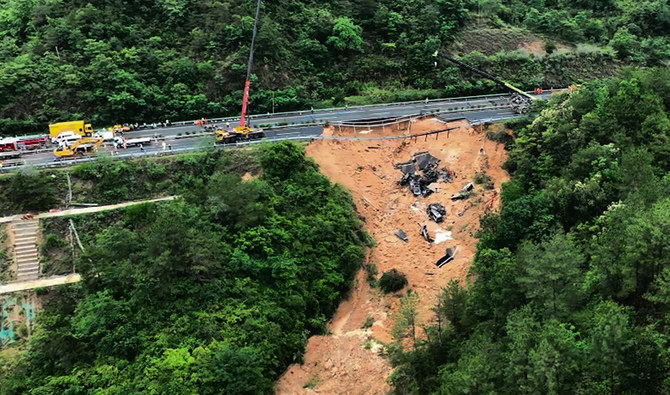
- One side of four-lane highway in Meizhou city gave way after a month of heavy rains
- Twenty-three vehicles fell down a steep slope, some sending up flames as they caught fire
BEIJING: The death toll from a collapsed highway in southeastern China climbed to 48 on Thursday as searchers dug for a second day through a treacherous and mountainous area.
One side of the four-lane highway in the city of Meizhou gave way about 2 a.m. on Wednesday after a month of heavy rains in Guangdong province. Twenty-three vehicles fell down a steep slope, some sending up flames as they caught fire. Construction cranes were used to lift out the burnt-out and mutilated vehicles.
Officials in Meizhou said three other people were unidentified, pending DNA testing. It wasn’t immediately clear if they had died, which would bring the death toll to 51. Another 30 people had non-life-threatening injuries.
The search was still ongoing, Meizhou city Mayor Wang Hui said at a late-afternoon news conference. No foreigners have been found among the victims, he said.
Search work has been hampered by rain and land and gravel sliding down the slope. The disaster left a curving earth-colored gash in the otherwise verdant forest landscape. Excavators dug out a wider area on the slope.
“Because some of the vehicles involved caught fire, the difficulty of the rescue operation has increased,” said Wen Yongdeng, the Communist Party secretary for the Meizhou emergency management bureau.
“Most of the vehicles were buried in soil during the collapse, with a large volume of soil covering them,” he said.
He added that the prolonged heavy rainfall has saturated soil in the area, “making it prone to secondary disasters during the rescue process.”
Over 56 centimeters (22 inches) of rain has fallen in the past four weeks in the county where the roadway collapsed, more than four times as much as last year. Some villages in Meizhou flooded in early April, and the city has seen more rain in recent days.
Parts of Guangdong province have seen record rains and flooding in the past two weeks, as well as hail. A tornado killed five people in Guangzhou, the provincial capital, during rain and hail storms last weekend.
The highway section collapsed on the first day of a five-day May Day holiday, when many Chinese are traveling at home and abroad.
Chinese leader Xi Jinping said that all of China’s regions should improve their monitoring and early warning measures and investigate any risks to ensure the safety of the public and social stability, state broadcaster CCTV said.
UK Veteran’s Minister Mercer to risk jail over Afghanistan inquiry
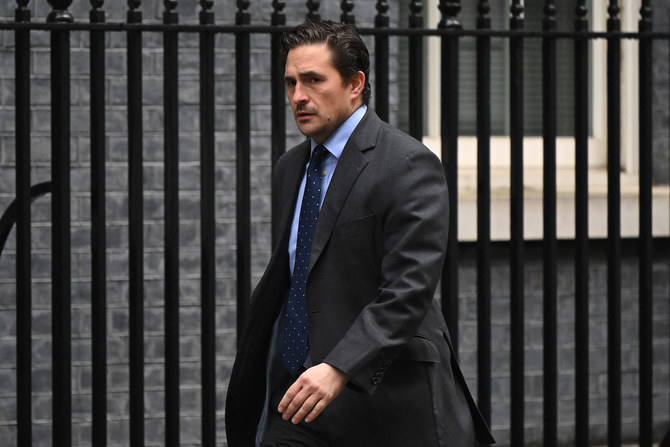
- Friends suggest minister will refuse to hand over identities of whistleblowers over fears for their well-being
- Mercer faces potential 52-week jail term, which would cost him his role as a minister and MP
LONDON: UK Veteran’s Minister Johnny Mercer will risk prison by not revealing the identities of whistleblowers to an inquiry investigating the killings of innocent people in Afghanistan.
The Times reported that friends of the MP had suggested he would rather be a “man of integrity” over the matter ahead of a deadline to hand the names to the inquiry, chaired by Lord Justice Haddon-Cave, next week.
Mercer has already given evidence to the inquiry, which is investigating allegations of extrajudicial killings and cover-ups by UK Special Forces between 2010 and 2013.
Appearing in February, he said a Special Forces soldier told him that in 2017 he was asked to carry a weapon to plant on an unarmed civilian to make them seem like an enemy combatant. He refused to reveal the source and others out of fear for their safety, with suggestions that some may be suffering from post-traumatic stress disorder and could be mentally vulnerable.
Haddon-Cave gave Mercer until April 5 to reveal the names, which was later extended. Failure to comply, he was warned, could result in a year-long prison term, which would cost him his job as a minister and his position as an MP. He could also face a fine.
One friend of the MP told The Times: “The inquiry doesn’t seem to realise that nothing will destroy their authority more than putting the veterans’ minister in the dock — the one man the military community trusts.
“If they do this, no one from the military community will want to co-operate with the inquiry. They seem to think Mercer will fold under the pressure and they will get their way. But he won’t. He will go down as a man of integrity and the inquiry will lose all support.”
Former Armed Forces Minister James Heappey said Mercer should reveal the identities of his sources.
“I admire Johnny enormously for the way that he has done politics under his own rules with an incredible sense of mission … He is a remarkable man but on this particular point I think for him, for his family and actually for the credibility of the inquiry I think he does need to disclose these names,” Heappey said.
On Friday, the inquiry will examine the Ministry of Defence’s failure to provide evidence to it on time. It is still waiting to hear from senior officials, including former Defence Secretary Ben Wallace.
It has also heard allegations that Gen. Gwen Jenkins, future national security advisor and former Special Boat Service head, locked away a report into claims of extrajudicial killings instead of passing it to military police.
Mercer also suggested during the inquiry, which began in December 2022, that the next head of the UK Army Lt. Gen. Sir Roly Walker had given “unbelievable” testimony over claims that Special Air Service personnel had killed unarmed Afghans.
An investigation by The Times, meanwhile, has suggested that former members of specialist Afghan Army units CF 333 and ATF 444 could provide crucial witness testimony to the inquiry but that their subsequent relocation from Afghanistan was overseen by MoD officials in a potential conflict of interest.
Many had their asylum claims to come to the UK rejected, a decision now under review.
Arrests made at protests against UK arms sales to Israel
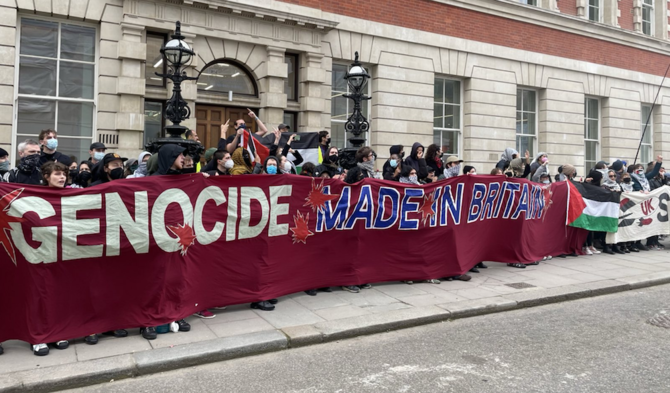
- Police in London, Glasgow called to deal with demonstrations
- ‘Protesters must stay within the law,’ Metropolitan Police says
LONDON: Police in London said they made three arrests at demonstrations held on Wednesday to protest against the sale of UK arms to Israel.
Protesters gathered outside the offices of the Department for Business and Trade in central London and more than 1,000 workers and trade unionists held protests at sites linked to BAE Systems across the UK.
“We are policing a protest in Admiralty Place and Horse Guards Parade,” the Metropolitan Police said in a statement.
“Officers have made three arrests after protesters blocked access to a building. Protesters must stay within the law.”
Police Scotland also confirmed its officers were called to a site in Glasgow to deal with protesters on Wednesday.
Members of Workers for a Free Palestine said the group was “escalating its tactics” by targeting BAE Systems cities and the British government department on the same day, the Independent reported.
“Our movement forced the issue of an arms embargo onto the table and polling shows the majority of the British public want to see arms sales to Israel banned, yet the government and also the Labour Party continue to ignore the will of the people,” a WFP protester named Tania, who took to the streets in London, told the newspaper.
“The government has sought to play down the scale of its arms supplies to Israel but the reality is UK arms and military support play a vital role in the Israeli war machine and evidence that three British aid workers were killed by a drone partly produced in the UK shows the extent of British complicity in Israel’s genocide,” she said.
Another protester, named Jamie, who was demonstrating in Glasgow, said: “Our fundamental aim is for the UK government to introduce an arms embargo. It’s the morally right thing to do.
“It’s vital that action is taken. It’s been almost seven months of death and destruction in Palestine and the idea that that is being committed by weapons that are being produced in our neighborhoods is horrifying.
“Our long-term goal is an arms embargo from the government but our short-term aim here today is to just disrupt business as usual for BAE, to disrupt the manufacture, to cost them time, cost them money and slow down the trade of weapons to Israel.”
BAE Systems said it respected people’s “right to protest peacefully” and that its arms exports complied with regulations.
“The ongoing violence in the Middle East is having a devastating impact on civilians in the region and we hope the parties involved find a way to end the violence as soon as possible,” it said.
“We operate under the tightest regulation and comply fully with all applicable defense export controls, which are subject to ongoing assessment.”
US defends talking to Taliban in Afghanistan
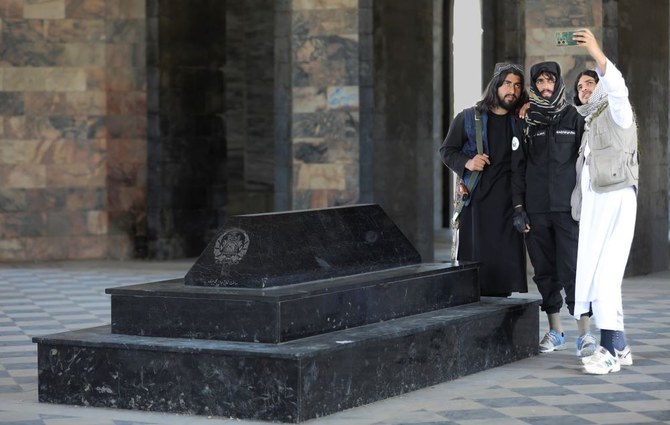
- Dialogue works in US interests, supports Afghan people, State Department says
- Taliban took power in 2021 following withdrawal of US-led coalition
LONDON: The US State Department has defended talking to the Taliban in order to serve Washington’s interests in Afghanistan and the wider region.
The department’s principal deputy spokesperson, Vedant Patel, told reporters that talking with the group not only worked in US interests but supported “the Afghan people.”
The Taliban took control of Afghanistan in 2021 following the withdrawal of US-led coalition forces and the collapse of the Western-backed Afghan government.
They have drawn significant hostility on the international stage for their repression of people, especially their treatment of women and girls, limits on education and reintroduction of violent punishment.
Some fear engaging with the Taliban could lend them legitimacy, but Patel said dialogue between the group and the US “allows us to speak directly with the Taliban, and it’s an opportunity for us to continue to press for the immediate and unconditional release of US nationals in Afghanistan, including those who we have determined to be wrongfully detained.”
“We’ll also use those opportunities to directly talk about the Taliban’s commitments to counterterrorism and of course, as always, human rights is also on the agenda,” he said.



